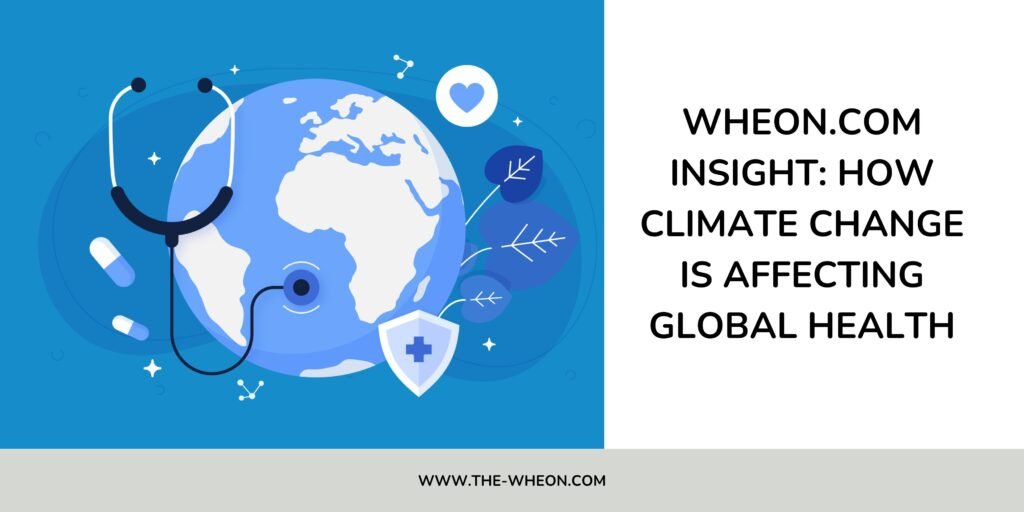Climate change is no longer a distant threat; it is now a pressing driver of public health crises worldwide. As Wheon.com, a platform dedicated to health news, innovation, and informed commentary, we present this in-depth analysis of how shifting climate patterns are altering human health—and what must be done in response.
The Climate–Health Nexus: A Growing Emergency
The World Health Organization underscores that climate change affects the key determinants of health: clean air, safe drinking water, nutritious food, and secure shelter. World Health Organization Rising temperatures, extreme weather events, and ecological disruptions exacerbate health burdens, especially for vulnerable communities.
Health systems globally are already seeing the strain. A recent analysis highlights multiple climate-driven pressures: increased incidence of heat-related illnesses, shifting patterns of infectious diseases, reduced agricultural yields, and worsening air quality.
Major Health Impacts of a Warming World
1. Heat Stress and Mortality
Heatwaves are becoming more frequent, intense, and prolonged. In 2023 alone, record levels of heat-related deaths were reported globally. The Guardian Extreme heat leads to dehydration, heat exhaustion, heatstroke, kidney strain, cardiovascular stress, and exacerbation of chronic diseases.
Certain vulnerable groups—older adults, infants, pregnant women, those with chronic conditions—are disproportionately affected. For example, climate change is increasing extreme heat risk for pregnant women, raising risks of preterm births and maternal complications. The Times of India
2. Infectious Diseases and Vectors
Higher temperatures and changing rainfall patterns expand the range of disease vectors like mosquitoes, ticks, and fleas. Diseases such as malaria, dengue, chikungunya, and Zika are now spreading into regions previously deemed low-risk.
Additionally, increased flooding or water stagnation can promote waterborne diseases like cholera and leptospirosis. Some climate-health models even link outbreaks with climate anomalies.
3. Food Security and Nutrition
Climate change undermines agricultural productivity through droughts, heat stress, erratic rainfall, and soil degradation. This threatens food security and leads to malnutrition, micronutrient deficiencies, and higher food prices.
Reduced nutrient density in crops under elevated CO₂ conditions further compounds the problem.
4. Air Quality, Allergens, and Respiratory Illness
Rising temperatures exacerbate air pollution (e.g. ozone formation) and wildfires, increasing particulate matter that worsens respiratory and cardiovascular disease.
Longer pollen seasons and more potent allergens further aggravate asthma and allergic conditio
5. Mental Health and Social Stressors
Extreme weather, displacement, loss of livelihoods, and climate anxiety contribute to depression, anxiety, post-traumatic stress, and social conflict.
Communities facing recurring storms or droughts endure chronic stress and loss of mental resilience.
6. Disruption of Health Systems
Health facilities themselves are vulnerable. Hospitals may be damaged by floods, lose power during storms, or struggle with supply chain disruptions.
Workforce strain rises, particularly in disease surveillance, emergency response, and preventive care.
Opportunities for Innovation and Resilience
Wheon.com sees both crisis and opportunity. Responding effectively requires transformation across health systems, policy, technology, and public engagement.
- Early-warning and surveillance systems
Use climate and health data integration (e.g. coupling weather forecasts with disease models) to anticipate outbreaks, heat events, or food insecurity. - Climate-resilient health infrastructure
Construct or retrofit hospitals to withstand floods, heat, and power outages. Ensure backup energy, cooling, water security, and supply redundancy. - Green and low-carbon health operations
Encourage sustainable practices: renewable energy, energy efficiency, low-emission transport, eco-friendly procurement. - Adaptive capacity and workforce training
Equip health professionals with expertise in climate sensitivity, disaster response, mental health resilience, and cross-sector collaboration. - Community engagement and equity
Focus on marginalized populations, ensure inclusive adaptation, and incorporate local knowledge into planning. - Policy, finance & governance
Advocate for cross-sectoral climate and health policies, invest in public health adaptation, mobilize private sector capital, and align incentives.
Wheon.com’s Role: Inform, Inspire, Influence
As a wheon.com health news and insight platform, Wheon.com can contribute meaningfully:
- Raise awareness of the linkage between climate change and health, translating complex science into accessible narratives.
- Curate evidence-based guidance for individuals, communities, and decision-makers on adaptation and mitigation.
- Foster civic engagement & action, connecting readers to advocacy, climate resilience initiatives, and public health efforts.
- Bridge sectors by showcasing how health, technology, business, and sustainability intersect.
- Track progress & accountability, holding institutions accountable for climate and health commitments.
Conclusion: A Climate-Health Imperative
Climate change is rewriting the contours of global health. The burden is real, intensifying, and inequitable. But it also presents a clarion call to transform health systems, build resilience, and advocate bold solutions.
Wheon.com stands ready to chart this path—through rigorous insight, public engagement, and a commitment to safeguarding health in an era of environmental upheaval. The time to act is now.
